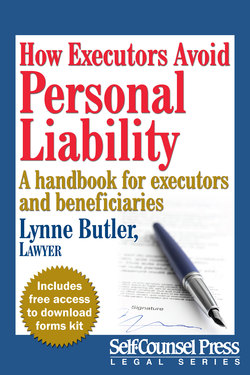Читать книгу How Executors Avoid Personal Liability - Lynne Butler - Страница 7
На сайте Литреса книга снята с продажи.
3. An Executor Is a Fiduciary
ОглавлениеExecutors, by definition, are fiduciaries. This legal term refers to anyone who holds property, money, or information for someone else and who has a duty towards the person or people for whom those assets are held. This aspect of being an executor is arguably the most important characteristic of the executor’s job. It will give rise to most of the complaints and questions about executors, even though the word “fiduciary” most likely does not appear in the will. This is because by accepting the job as an executor, you have accepted the fact that you owe a duty of loyalty to the estate, even when that loyalty conflicts with your best interests.
Some professionals, such as lawyers, accountants, bankers, and brokers, are also fiduciaries, and there are rules in place to ensure that they use the assets of an estate for the right purposes.
An executor is in conflict of interest if he or she cannot reconcile his or her personal interests with that of the estate, or if it appears to others that they cannot be reconciled. Few people can really overlook his or her own wishes when it comes to an estate. This may make it difficult to fulfill the fiduciary duties required.
A commonly seen example of an executor who is in a conflict of interest position is that of a spouse or child of the deceased who is the executor, but who wants to make a claim for a larger portion of the estate. The conflict arises because it is the executor’s job to represent and defend the estate when any claim is made. It is impossible to sue the estate and defend the estate on the same lawsuit. An executor who is in a conflict of interest should step down as executor because it is impossible for him or her to properly act as a fiduciary.
Another important issue for executors that arises from their positions as fiduciaries is that of improper delegation. The general rule is that an executor cannot delegate his or her discretion. In other words, the deceased has asked you to step into his or her shoes to make decisions; you cannot then ask someone else to make those decisions.
We know that executors are allowed to hire people to help with an estate. As an executor, you may hire someone to help you carry out the decisions you have made, but you must be careful not to cross the line into letting others actually make the decisions for you. Executors are allowed to delegate tasks that are purely administrative, which allows you to hire a lawyer to apply for probate, an accountant to prepare a tax return, or a realtor to sell a property.
The key to avoiding liability when delegating these tasks is that you must make the decision to obtain probate and to place the values on the estate. You must decide that a return needs to be filed. You must decide that a property is to be sold and decide whether any particular offer is to be accepted. You have the responsibility and the liability for those decisions.
There is also a “reasonability” test. This means that executors are allowed to hire agents for assistance where it is reasonable to do so. Not every estate is complicated or large in value, and not every task is complex. An executor should only hire an agent when it is reasonable to do so in the circumstances of a particular estate. As a general rule, the courts have agreed that it is reasonable for executors to hire financial advisors or money managers to assist with investments, so you will not be held liable for delegating the management of a portfolio to them.
Executors and administrators are also affected by Canada’s income tax laws, whether or not those laws are mentioned in the will. This is because our Income Tax Act specifically says that any legal representative (which includes executors and administrators) is responsible for any taxes that are not paid if the legal representative pays out the beneficiaries before paying the tax. Again, this is something that you may not see in the will, but you are expected to find out when you start acting as an executor.
